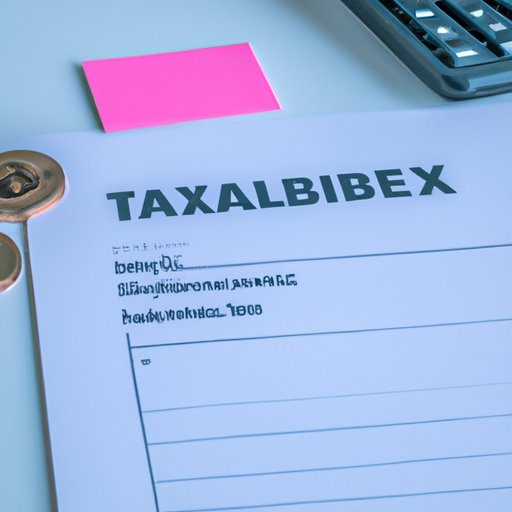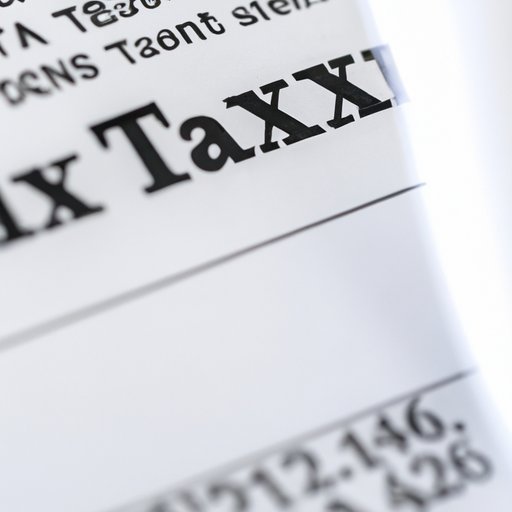Introduction
Cryptocurrency is a digital asset that can be used as a medium of exchange. It is decentralized and not issued or backed by any government or central bank. Cryptocurrency is gaining in popularity, due to its potential for faster and cheaper transactions than traditional currencies. As such, it is important to understand the tax implications of trading and investing in cryptocurrency.
Exploring the Tax Implications of Cryptocurrency Trading
When it comes to cryptocurrency trading, the Internal Revenue Service (IRS) considers any profits or losses to be taxable income. This means that when you sell, trade, or use cryptocurrency to purchase goods and services, you need to keep track of your transactions and report any gains or losses on your taxes. Here are some key points to consider when it comes to the tax implications of cryptocurrency trading.
Capital Gains and Losses
Capital gains and losses refer to the difference between what you paid for a cryptocurrency and what you received when you sold it. If you bought a cryptocurrency for $10 and sold it for $20, then your capital gain would be $10. Similarly, if you sold a cryptocurrency for $5 less than you bought it for, then you would have a capital loss of $5. Capital gains and losses are reported on your taxes and are taxed at different rates depending on how long you held the cryptocurrency.
Taxable Events
In addition to capital gains and losses, there are also other taxable events related to cryptocurrency trading. These include mining, exchanging one cryptocurrency for another, and using cryptocurrency to purchase goods and services. Each of these activities may have different tax implications, so it is important to understand the different rules for each type of transaction.
Tax Rates
The tax rate for capital gains and losses from cryptocurrency trading depends on how long you held the cryptocurrency before selling it. Short-term capital gains (from holding the cryptocurrency for one year or less) are taxed at your regular income tax rate, while long-term capital gains (from holding the cryptocurrency for more than one year) are taxed at lower rates. It is important to understand the different tax rates for each type of gain or loss, as this can significantly affect your overall tax liability.
How to File Taxes for Crypto Profits
Filing taxes for crypto profits can be complicated, but there are several tools and resources available to help make the process easier. Here are some tips for filing your crypto taxes:
What Information You Need to File Crypto Taxes
Before filing your taxes, you will need to gather all of the necessary information about your cryptocurrency transactions. This includes the date of each transaction, the amount of cryptocurrency involved, the exchange rate at the time of the transaction, and any associated fees. You will also need to calculate your capital gains and losses for each transaction.
Software and Tools Available to Help You File
There are many software programs and online tools available to help you file your crypto taxes. These tools can automatically generate tax forms based on your transactions and provide helpful guidance on how to properly report your gains and losses. Some of the most popular tools include CryptoTrader.tax, CoinTracker, and TaxBit.
Tips for Filing Crypto Taxes
When filing your crypto taxes, it is important to keep accurate records of all of your transactions and to report all of your gains and losses accurately. Additionally, you should make sure to take advantage of any deductions that may be available to you, such as the foreign tax credit. Finally, make sure to review your tax return carefully before submitting it to avoid any costly mistakes.

What You Need to Know About Crypto and Taxation
In addition to understanding the tax implications of cryptocurrency trading, it is also important to understand the regulatory landscape surrounding cryptocurrency. This includes understanding the various laws and regulations governing cryptocurrency trading in your country or region. Additionally, it is important to keep records of all of your crypto transactions in order to ensure accurate reporting on your taxes.
Understanding the Tax Requirements for Cryptocurrency Transactions
When it comes to cryptocurrency transactions, there are different tax requirements depending on whether the transaction resulted in a short-term or long-term gain. Short-term gains are taxed at your regular income tax rate, while long-term gains are taxed at lower rates. Additionally, there may be other tax considerations, such as foreign tax credits, that you need to take into account when filing your taxes.

The Basics of Filing Crypto Taxes
Once you have gathered all of the necessary information, you can begin filing your crypto taxes. You will need to file your taxes by the deadline, which is usually April 15th. When filing, you will need to report all of your capital gains and losses for the year, as well as any other taxable events. Additionally, you should make sure to take advantage of any deductions that may be available to you.

A Guide to Crypto Tax Compliance
Finally, it is important to understand the different types of crypto tax forms that you may need to file. The most common form is the IRS Form 8949, which is used to report capital gains and losses from cryptocurrency transactions. Additionally, there may be other forms that you need to file, such as the FBAR or FATCA forms. It is important to understand the different forms and the information that needs to be reported on each one.
Conclusion
Cryptocurrency trading can have significant tax implications. This guide has provided an overview of the tax implications of cryptocurrency trading, including capital gains and losses, taxable events, tax rates, and filing tips. Additionally, it is important to understand the regulatory landscape and to keep accurate records of all of your crypto transactions. By understanding the tax requirements for cryptocurrency transactions and taking advantage of the tools and resources available, you can ensure that you are in compliance with the law and that you are filing your taxes correctly.
(Note: Is this article not meeting your expectations? Do you have knowledge or insights to share? Unlock new opportunities and expand your reach by joining our authors team. Click Registration to join us and share your expertise with our readers.)
